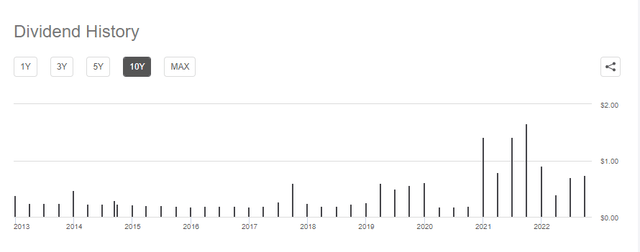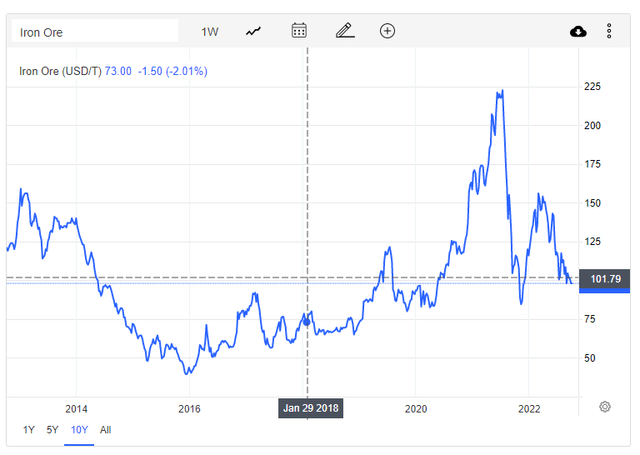Smederevac/iStock via Getty Images
Labrador Iron Ore Royalty Corporation (OTCPK:LIFZF) owns a 7% royalty interest, a 10 cent/ton commission, and a 15% equity interest in the Iron Ore Company of Canada’s mine. I’ll refer to the entities as LIORC and IOC to not bore you. LIORC usually pays dividends from its net income to the maximum extent possible. IOC is a joint venture between Rio Tinto (RIO) who own 58.7% and operate the mine, and Mitsubishi (OTCPK:MSBHF), who own 26.2% and this company.
The mine is a large, high-quality resource with a long mine life ahead. IOC should easily have 20+ years of mine life ahead.
IOC’s is on a good spot on the cost curve. Since 1962, the mine has never shut down due to market conditions. Operating may still have been unprofitable from time to time, but because LIFZF owns a 7% royalty interest, that’s less of a concern. The mine’s operating capacity has expanded significantly between 2008 and 2014, and the company is still trying to up the production rate of around 18 million tonnes in the direction of 23 million tonnes. When IOC pays out a dividend LIORC passes that through. Due to CapEx, the dividends paid by IOC aren’t as predictable as the royalty take rate. However, at especially high iron ore prices, there’s a lot of leverage in the mining businesses, and these lumpy payments can get quite big.
LIORC is debt free and its dividend history looks as follows:
Dividend history LIORC (Seeking Alpha)
You’ll immediately notice recent payments have been especially large, which is due to strong iron prices.
The immediate outlook for iron ore isn’t exactly pleasant, with SPGlobal recently reporting:
With China’s property slump and pandemic resurgence putting a lid on hopes for demand recovery, iron ore prices in Asia will continue to grind lower in the fourth quarter as steel production cuts intensify during the winter season.
But iron ore prices are still relatively high:
Iron ore price (Trading Economics)
There can be a bit of a slide, and LIORC will still make money. The 7% royalty isn’t that sensitive to prices. Even in the period between 2014 to 2019, LIORC was still paying out dividends. Smaller dividends (about $0.80 annually), but still interesting. It would be around a ~3.7% yield on current prices. It’s not a sustainable yield, though, because ultimately (20+ years down the line), the mine will eventually run out of ore. It could be longer than the current mine life, but it will happen later. At current dividend levels (likely coming down) the “yield” is still 13.19%.
Compared to many stocks, this may not sound all too attractive. What if iron ore slides (like it’s likely to do given the Fed is tightening)? Suddenly, you end up holding something yielding 4-5%… Compared to stocks that seems kind of bad. But I’ll argue this company is very hard to kill. It has no debt and is virtually guaranteed to be profitable and pay out dividends. When I compare this to bond, I start to like it a lot. It is a lot like a bond (except it declines to zero) and its “coupon” is highly volatile. The iShares iBoxx $ High Yield Corporate Bond ETF (HYG) trades at an SEC yield of around 8.13%. But that’s a high-yield index and if iron ore prices take a hit (like if we’re going into recession) the high-yield index should experience quite a few defaults. This would cut into that yield big time. Not to mention there’s some interest rate risk if the Fed continues to hike.
Labrador Iron Ore Royalty Corporation is a bit of an odd duck. It is not really your regular dividend stock and it is definitely not a bond. However, I think it yields a lot and is relatively safe if I compare it to these asset classes, and that’s why I like it in my portfolio.


Be the first to comment